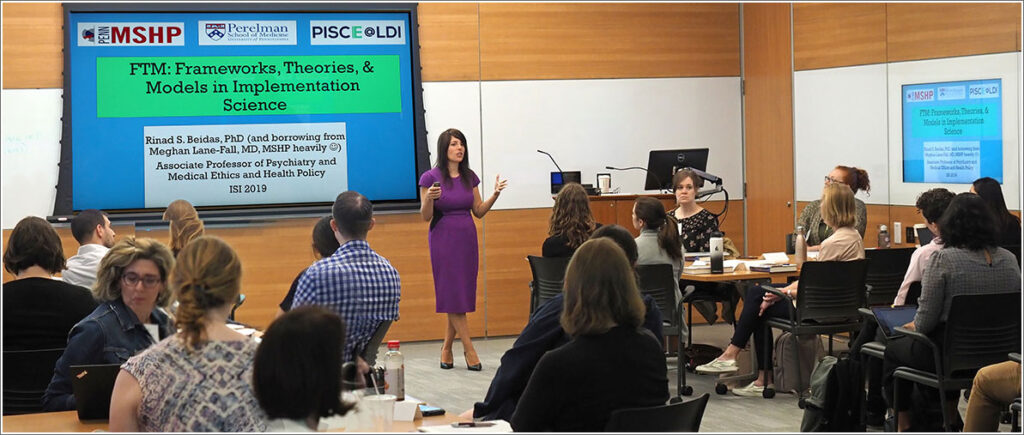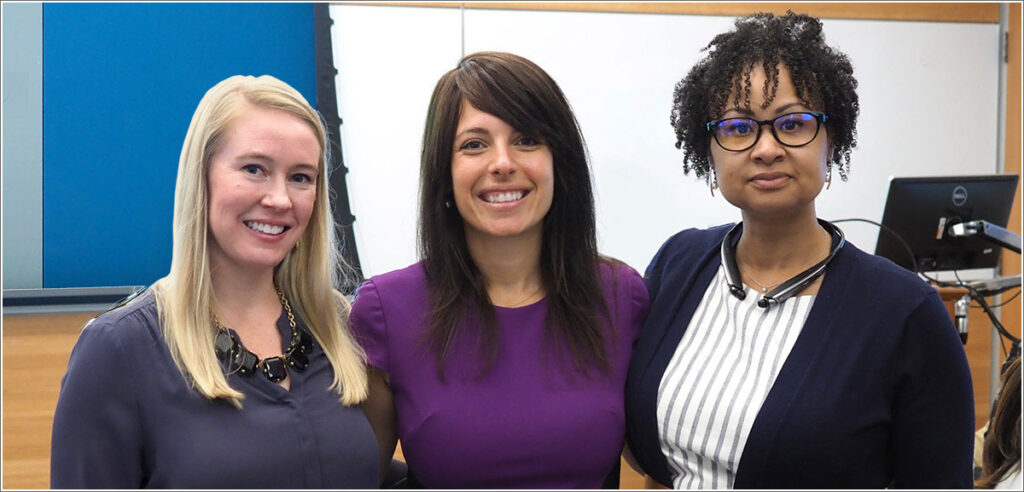Health Care Access & Coverage
News
Penn Implementation Science Institute Course Draws Widening Interest
Third Year of Intensive Three-Day Curriculum Sold Out in Advance

One of the first of its kind, the University of Pennsylvania Implementation Science Institute within the Master of Science in Health Policy Research (MSHP) program completed its third annual course for health care faculty and other trainees from around the country. Rinad Beidas, PhD (above), addresses a session.
As a University of Pennsylvania team of health services researchers recently finalized preparations for their third annual Implementation Science Institute, the new level of demand required that they create a waiting list and turn some people away.
“It’s exciting to see how fast the interest in this field is now spreading,” said Rinad Beidas, PhD, an Associate Professor of Psychiatry and Director of the Penn Implementation Science Center (PISCE) at the Leonard Davis Institute of Health Economics (LDI). “When we did the first institute three years ago, it was just a proof of concept thing. We weren’t sure if people would come. But they’ve been coming ever since.”
One of the first
Located within Penn’s Masters of Science in Health Policy Research (MSHP) program and co-sponsored by PISCE, the Implementation Science Institute is one of the first of its kind and open to academics and health administrators from any institution.
The intense three-day curriculum is essentially a crash course in the concepts and methods of implementation science research. That discipline is focused on reducing the time it takes for new research discoveries to move into actual practice. The main goal is to improve the quality of health care services and outcomes throughout the U.S. health care system.
The increase in NIH funding opportunities in this space has driven a lot of interest and signaled to the scientific community that implementation science is a legitimate science.
Rinad Beidas
The keynote speaker at this year’s Institute was Wynne Norton, PhD, Director of the Implementation Science Team in the Division of Cancer Control and Population Sciences of the National Cancer Institute (NCI). Her research has focused on both the implementation of new evidence-based practices and the de-implementation of less effective old ones.
The Institute is led by Beidas and two other Penn faculty members: Judy Shea, PhD, a Professor of General Internal Medicine and Co-Director of the MSHP program, and Meghan Lane-Fall, MD, MSHP, Assistant Professor of Anesthesiology and Critical Care and Co-Director of the Center for Perioperative Outcomes Research and Transformation. All three are LDI Senior Fellows. Beidas and Lane-Fall also separately teach a semester-long course (HPR 611) in implementation science for MSHP students.
Spike in researcher interest
“There’s a number of reasons, we’re seeing such a spike in interest in this topic,” said Beidas, “One is investigators’ true desire to ensure that their discoveries and innovations have impact; they’re very aware that many of their research-based interventions or practices are currently not reaching the people they’re intended to reach.”
“Another,” Beidas continued, “is the increase in NIH funding opportunities in this space that have driven a lot of interest and signaled to the scientific community that implementation science is a legitimate science and that people ought to be learning the skill set needed to conduct this type of work.”
